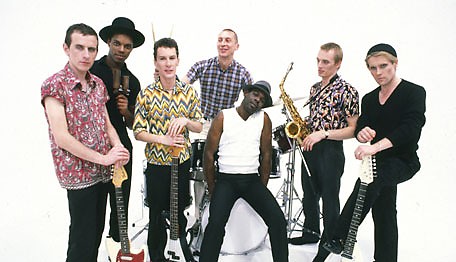
By the late 1980s ska was tired and in need of a heart and lung transplant. Orange County would, in fact, become home to the biggest and most influential of so-called third wave of ska revivals (there was also one in New York) because it had two things vital to the development of any such trend: inventory (meaning bands) and a willing audience.
There were dozens upon dozens of bands in and around OC that were adding horns and dabbling in double-time beats — thus feeling their way into a brassy mix of punk, reggae and power pop. They drew a huge fan base. The new ska offered its followers party music instead of grunge angst or rock melodrama.
]
Consider The Aquabats. Back in the day, they dressed up like superheroes and performed goofball songs about action figures. What's not to like? Consider also that ska had its own radio show. The Ska Parade (on KROG 97 and SP Radio One) began spinning many So-Cal ska locals, thus becoming a sort-of launch pad that led to success for some.
It may be difficult for some to cast Anaheim's No Doubt with the rest of hardcore ska, but it was their 1995 breakout single “Spiderwebs” that put “skank” (ska + punk) into the Top 40. The following year Sublime, too, scored a hit off their self-titled third album. Another OC third waver that tasted commercial success was Reel Big Fish, whose Sell Out charted in 1997. “Ska'd for Life” bumper stickers were everywhere.
Dating back to 1950s pre-reggae Jamaica, the original ska would forever change music there and around the planet. The second wave of ska, also known as “two (or 2) tone” was started in Britain during the '70s by Two Tone Records. Popular at first with mods and eventually with their nemeses, the skinheads, 2 tone had run its course somewhere by the finish of the '80s, getting pulverized by shitty New Wave.
[
Tazy Phillips, the Irvine fan who is credited with launching Ska Parade, boiled the third coming of ska in Orange County down to one thing: audiences just wanted to have a good time, which brings us to the subject of fellatio and “Save It for Later” (on the album Beat This, no less). Possibly one of the best-known ska songs of all time, it is inordinately cheery due to its odd guitar tuning. Dave Wakeling, founder and leader of the 2 tone English Beat wrote it when he was 18 or 19. It is a song that contains a built-in prank. Sing the line “save it for later,” but in the way a British guy might: save it fah-later. Fah-later. Get it?
“This was the main point, really,” Wakeling once told me. “It was how many times you could say 'fellator' in a song on the radio. In 30 years it's actually been quite a lot.”
The English Beat perform at Madhaus in Long Beach Saturday night.
Ska Parade now airs Sun. 9-11 p.m. PST on KUKQ.com.

